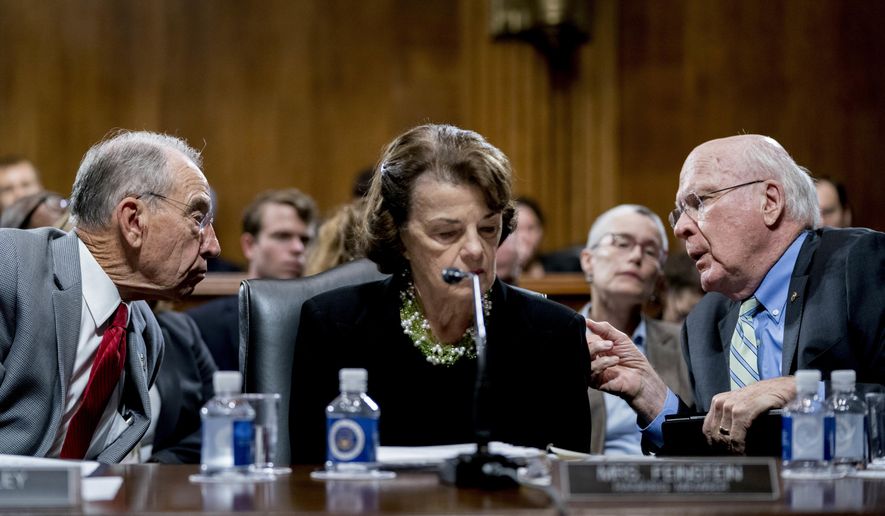Democrats uncorked a fusillade of attacks on President Trump’s Supreme Court nominee Thursday — including suggesting that he is now under a federal investigation for a decades-old encounter — as they sought to upset Republicans’ push toward confirmation.
Sen. Dianne Feinstein of California, the top Democrat on the Senate Judiciary Committee, revealed that she had obtained and forwarded to investigators information about an incident from Judge Brett M. Kavanaugh’s past.
Ms. Feinstein declined to disclose details, saying the accuser didn’t want to come forward, but she said she felt obligated to prod investigators. News reports said the information pertained to sexual misconduct from the judge’s time in high school more than three decades ago.
The White House said the allegation was a last-minute smear, saying Judge Kavanaugh has been vetted by the FBI throughout a lifetime of public service, including the George W. Bush White House and several confirmation battles.
“Throughout his confirmation process, Judge Kavanaugh has had 65 meetings with senators — including with Sen. Feinstein — [and] sat through over 30 hours of testimony, addressed over 2,000 questions in a public setting and additional questions in a confidential session. Not until the eve of his confirmation has Sen. Feinstein or anyone raised the specter of new ’information’ about him,” said Kerri Kupec, a White House spokeswoman.
The FBI declined to pursue a criminal investigation, according to the Washington Post.
SEE ALSO: Democrats raise six subpoenas, protesting Kavanaugh vote
A source close to the nomination process told The Washington Times the letter was turned over to the White House to place into Judge Kavanaugh’s background folder, which will be handed over to Sen. Charles E. Grassley, committee chairman.
The letter had been handed over to Ms. Feinstein more than a month ago, and Judge Kavanaugh was never asked about it during his public or closed-door sessions with the senator, the source told The Times.
Ms. Feinstein’s revelation, though, became public after the Judiciary Committee, having completed a week’s worth of hearings, held its first meeting to debate the judge.
A vote was put off until Sept. 20, but Republicans said they are still on track.
Taylor Foy, a spokesman for Mr. Grassley, said the Iowa Republican is aware of Ms. Feinstein’s referral.
“At this time, he has not seen the letter in question and is respecting the request for confidentiality,” Mr. Foy said. “There’s no plan to change the committee’s consideration of Judge Kavanaugh’s nomination.”
During the meeting Thursday, Democrats said they had plenty of reasons to delay the process.
They attempted to have the committee issue six subpoenas for documents that they said senators should see before voting.
Those documents were generally from Judge Kavanaugh’s time working for Mr. Bush.
“Torture, Iraq — there were so many things that were brought forward at that time,” Ms. Feinstein said. “What in Judge Kavanaugh’s records are Republicans hiding?”
Democrats have argued that they need to see millions of pages of documents that may have crossed Judge Kavanaugh’s desk during the six years he worked for Mr. Bush’s White House.
But Republicans have asked the National Archives to hand over records pertaining only to his time in the White House counsel’s office from 2001 to 2003, not the documents from his time as staff secretary from 2003 to 2006.
The subpoenas Democrats were demanding sought documents pertaining to Judge Kavanaugh’s thoughts on Native Hawaiians, Alaskan Natives and American Indians, documents that might detail his views on presidential powers, and testimony from witnesses that Democrats thought could shed light on the judge’s past.
Republicans defeated each of those requests on party-line votes, saying the committee already had received a record number of documents.
Democrats said that many of the documents that have been released are considered confidential to the committee and can’t be shared outside the Senate.
In protest, Sen. Cory A. Booker, New Jersey Democrat, released dozens of the confidential documents online. He called it an act of civil disobedience and acknowledged that he was breaking Senate rules and could be expelled from the chamber.
A watchdog group has called for the ethics committee to review Mr. Booker’s conduct.
Mr. Grassley, meanwhile, said he has followed the same process as past hearings.
He said the committee is relying on the Bush presidential library and the National Archives to process information and noted that sitting presidents under law have a role in review, he said.
“The administration’s assertion is in line with those precedents,” Mr. Grassley said.
If Judge Kavanaugh clears the committee next week, then he will head to the full Senate for a vote. Republicans hope to confirm him before the Oct. 1 start of the Supreme Court session.
• Alex Swoyer can be reached at aswoyer@washingtontimes.com.




Please read our comment policy before commenting.